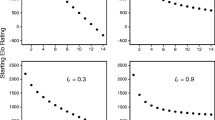Abstract
The performance of 22 adult male rhesus monkeys on a Fixed Interval 1-min reinforcement schedule was examined under conditions where the reinforcement probabilities were either 1.00 or .80. The results were then related to the social rank of animals at the time that they were taken from their social groups. Both high and low ranked animals reached criterion performance in the same number of trials. In general, high ranking animals responded at lower rates than low ranking animals when the reinforcement probability was 1.00. When the reinforcement probability was shifted to .80, all animals showed an increase in responding after nonreinforced intervals as compared with responses after reinforced intervals. The higher ranked animals tended to have a higher ratio of nonreinforced to reinforced responses than lower ranked animals.
Similar content being viewed by others
References
Allen, J. D. &D. R. Kenshalo Jr. 1976. Schedule-induced drinking as a function of interreinforcement interval in the rhesus monkey.J. Exper. Anal. Behav., 26: 41–51.
Amsel, A., 1958. The role of frustrative nonreward in noncontinuous reward situations.Psychol. Bull., 55: 102–119.
————, 1952. Motivational properties of frustration: Effect on a running response of the addition of frustration to the motivational complex.J. Exper. Psychol., 43: 363–368.
Bartlett, D. P. &G. W. Meier, 1971. Dominance status and certain operants in a communal colony of rhesus macaques.Primates, 12: 209–219.
Bernstein, I. S., T. P. Gordon, &R. M. Rose, 1974. Aggression and social controls in rhesus monkey (Macaca mulatta) groups revealed in group formation studies.Folia Primat., 21: 81–107.
Fry, W., R. T. Kelleher, &L. Cook, 1960. A mathematical index of performance on fixed-interval schedules of reinforcement.J. Exper. Anal. Behav., 3: 193–199.
Levine, M. D. &T. P. Gordon, 1968. Emotional response of rhesus monkeys to chronic psychological stress.Proceed. Army Sci. Conf., 2: 17–25.
McMillan, J. C., 1971. Percentage of reinforcement on fixed-ratio and variable-interval performances.J. Exper. Anal. Behav., 15: 297–302.
Meier, G. W., 1971. Operant cycles and imitational learning in a communal colony of rhesus macaques,Primates, 12: 221–227.
Porter, J. H. &D. R. Kenshalo, 1974. Schedule-induced drinking following omission of reinforcement in the rhesus monkey.Physiol. Behav., 12: 1075–1077.
Staddon, J. E. R. &Nancy K. Innes, 1969. Reinforcement omission on fixed-interval schedules.J. Exper. Anal. Behav., 12: 689–700.
Strayer, F. F., 1976. Learning and imitation as a function of social status in macaque monkeys (Macaca nemestrina).Anim. Behav., 24: 835–848.
Author information
Authors and Affiliations
Additional information
Supported by USAMRDC Contract No. DADA 17-73-C-3007.
About this article
Cite this article
Bunnell, B.N., Kenshalo, D.R., Allen, J.D. et al. Performance correlates of social behavior and organization: Social rank and omission of reinforcement in rhesus monkeys (M. mulatta). Primates 20, 77–86 (1979). https://doi.org/10.1007/BF02373829
Received:
Accepted:
Issue Date:
DOI: https://doi.org/10.1007/BF02373829




